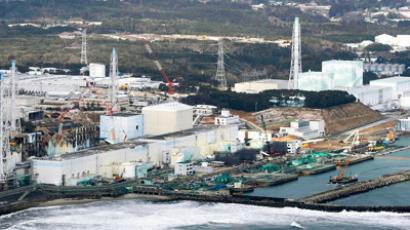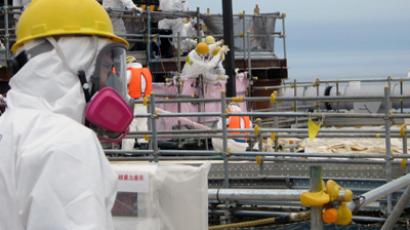Study claims USS Reagan crew exposed to extremely high levels of radiation near Fukushima

A new report on the nuclear crisis that started to unfold in Fukushima, Japan almost three years ago suggests that American troops who assisted with disaster relief efforts were exposed to unheard of radiation levels while on assignment.
Kyle Cleveland, a sociology professor at Temple University Japan, makes a case for that argument in an academic paper published in the Asia-Pacific Journal this week titled Mobilizing Nuclear Bias: The Fukushima Nuclear Crisis and the Politics of Uncertainty.
According to Cleveland, transcripts from a March 2011 conference call obtained through a Freedom of Information Act request shows that United States servicemen on the USS Ronald Reagan aircraft carrier experienced radiation levels 30-times above normal during relief operations that week.
During that March 13 phone call, Cleveland wrote, Troy Mueller —
the deputy administrator for naval reactors at the US Department
of Energy — said the radiation was the equivalent of “about
30 times what you would detect just on a normal air sample out at
sea.”
“So it's much greater than what we had thought,” Mueller
reportedly warned other American officials after taking samples
on the Reagan. “We didn't think we would detect anything at
100 miles.”
After Mueller made that remark, according to Cleveland’s transcript, Deputy Secretary of Energy Daniel Poneman asked him if those levels were “significantly higher than anything you would have expected.” He responded yes.
When Poneman later asked Mueller, “how do the levels detected compare with what is permissible,” Mueller said those on the scene could suffer irreversible harm from the radiation within hours.
“If it were a member of the general public, it would take -- well, it would take about 10 hours to reach a limit,” he said. At that point, Mueller added, “it’s a thyroid dose issue.”
If people are exposed to levels beyond the Protective Action Guideline threshold released by the Energy Department, Cleveland acknowledged in his report, radiation could have ravaged their thyroid glands.
When approached for comment by reporters at the website NextGov, however, Navy spokeswoman Lt. Cmdr. Sarah Flaherty said in an email that the crewmembers aboard the USS Reagan were never at danger of such exposure.
“Potentially contaminated personnel were surveyed with sensitive instruments and, if necessary, decontaminated. The low levels of radioactivity from the Fukushima nuclear power plant identified on US Navy ships, their aircraft, and their personnel were easily within the capability of ship's force to remedy,” Flaherty said
The latest report, NextGov’s Bob Brewin wrote, comes only days after the attorneys representing 79 USS Reagan crewmember filed an amended lawsuit in California against Tokyo Electric Power Co., or TEPCO., which has been accused of negligent with regards to maintain the Fukushima nuclear facility ahead of the March 2011 earthquake and tsunami that started the emergency.Attorneys for those servicemen are asking TEPCO for $1 billion in damages, and say that the infant child born of one of the crewmembers since the incident has a rare genetic disorder likely brought on by radiation exposure.
Attorneys in that suit say that “up to 70,000 US citizens [were] potentially affected by the radiation,” and might be able to join in their suit.














